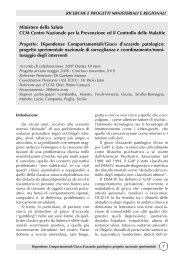Gaining health : analysis of policy development in European ...
Gaining health : analysis of policy development in European ...
Gaining health : analysis of policy development in European ...
You also want an ePaper? Increase the reach of your titles
YUMPU automatically turns print PDFs into web optimized ePapers that Google loves.
arguments for apply<strong>in</strong>g an <strong>in</strong>tegrated approach. The ga<strong>in</strong>s<br />
from a managerial po<strong>in</strong>t <strong>of</strong> view are also important.<br />
The most decisive argument <strong>in</strong> favour <strong>of</strong> an <strong>in</strong>tegrated<br />
approach is the ample scientific evidence on the common<br />
social and economic determ<strong>in</strong>ants <strong>of</strong> NCD (<strong>in</strong>clud<strong>in</strong>g<br />
lifestyle factors). Further, <strong>in</strong> many cases these determ<strong>in</strong>ants<br />
have an important <strong>in</strong>fluence on <strong>in</strong>equalities <strong>in</strong> NCD, so that<br />
vulnerable social groups are also at risk for NCD.<br />
This rationale related to <strong>health</strong> and <strong>in</strong>equality <strong>in</strong> <strong>health</strong> is<br />
<strong>in</strong> itself a sufficient argument for the use <strong>of</strong> coherent <strong>policy</strong><br />
tools and an <strong>in</strong>tegrated approach. WHO Strategic Objective<br />
No. 7 (34) seeks to address the underly<strong>in</strong>g social and<br />
economic determ<strong>in</strong>ants <strong>of</strong> <strong>health</strong> through policies and<br />
programmes that enhance <strong>health</strong> equity and <strong>in</strong>tegrate approaches<br />
that take <strong>in</strong>to account poverty, gender aspects<br />
and human rights. In this respect, the <strong>European</strong> NCD<br />
Strategy (1) is part and parcel <strong>of</strong> overall policies to promote<br />
social justice and <strong>in</strong>clusion and to reduce <strong>health</strong> <strong>in</strong>equalities.<br />
It is difficult to def<strong>in</strong>e criteria for assess<strong>in</strong>g whether NCD<br />
<strong>policy</strong> <strong>in</strong>tegration has been achieved and to what extent.<br />
Although countries have not formally articulated all the<br />
pr<strong>in</strong>ciples <strong>of</strong> an <strong>in</strong>tegrated NCD <strong>policy</strong> at national level,<br />
the absence <strong>of</strong> a formal national <strong>policy</strong> statement does not<br />
necessarily mean that no attempt at <strong>in</strong>tegration is be<strong>in</strong>g<br />
made. The process and elements <strong>of</strong> at least some degree <strong>of</strong><br />
coord<strong>in</strong>ation are observable <strong>in</strong> all the case-study countries.<br />
Furthermore, given the stage <strong>of</strong> NCD <strong>policy</strong> <strong>development</strong><br />
<strong>in</strong> some countries <strong>in</strong> the sample, and the study’s focus on<br />
process, it was possible to consider NCD <strong>policy</strong> <strong>in</strong>tegration<br />
more fully at the early stages <strong>of</strong> <strong>policy</strong>-mak<strong>in</strong>g. Thus more<br />
focus on coord<strong>in</strong>ated or <strong>in</strong>tegrated <strong>in</strong>puts and associated<br />
processes than on outcomes could be observed, <strong>in</strong>clud<strong>in</strong>g <strong>in</strong><br />
a few cases examples <strong>of</strong> common objectives or targets.<br />
It is possible that national Health for All-type policies,<br />
long-term public <strong>health</strong> strategies and even national heart<br />
<strong>health</strong> and cancer programmes could be key drivers <strong>in</strong> the<br />
<strong>in</strong>tegration process. In the light <strong>of</strong> our results, however, such<br />
broad umbrella policies are far from be<strong>in</strong>g a guarantee <strong>of</strong> a<br />
better-<strong>in</strong>tegrated NCD <strong>policy</strong> process.<br />
The countries where broad <strong>health</strong> policies have been<br />
implemented and susta<strong>in</strong>ed, <strong>in</strong> some cases over many years,<br />
are those characterized by a high quality <strong>of</strong> <strong>in</strong>formation and<br />
expertise, participation <strong>in</strong> <strong>in</strong>ternational level programmes,<br />
and a culture <strong>of</strong> consensus build<strong>in</strong>g. The susta<strong>in</strong>ability <strong>of</strong><br />
such efforts has apparently created long-term awareness<br />
<strong>of</strong> NCD challenges and facilitated the potential for crosssectoral<br />
work<strong>in</strong>g to tackle them.<br />
On the other hand, policies focus<strong>in</strong>g on relatively simple,<br />
discrete issues seem to have had a higher potential for<br />
achiev<strong>in</strong>g their aims than broader policies address<strong>in</strong>g<br />
complex issues. In some countries, <strong>in</strong>dividual risk-factor<br />
approaches have proved highly successful, ma<strong>in</strong>ly <strong>in</strong> the field<br />
<strong>of</strong> smok<strong>in</strong>g and nutrition and less so concern<strong>in</strong>g alcohol use<br />
and physical activity.<br />
Arguments <strong>in</strong> favour <strong>of</strong> develop<strong>in</strong>g issue-specific policies<br />
<strong>in</strong>clude:<br />
• the issue may be more clearly def<strong>in</strong>ed and understood,<br />
<strong>in</strong>clud<strong>in</strong>g l<strong>in</strong>ks between cause and effect;<br />
• measures for tackl<strong>in</strong>g the issue, as <strong>in</strong> the case <strong>of</strong> smok<strong>in</strong>g,<br />
may have been tried and tested;<br />
• the number <strong>of</strong> potential stakeholders is reasonably<br />
manageable; and<br />
• such issues are frequently supported by strong lobby<br />
groups.<br />
The disadvantage is that there appears to be considerable<br />
overlap and wastage between some <strong>of</strong> these vertical policies.<br />
Their lobby groups compete for resources and those<br />
with the loudest voices – not necessarily those with the<br />
Chapter 5<br />
247<br />
Reflections on experiences

















